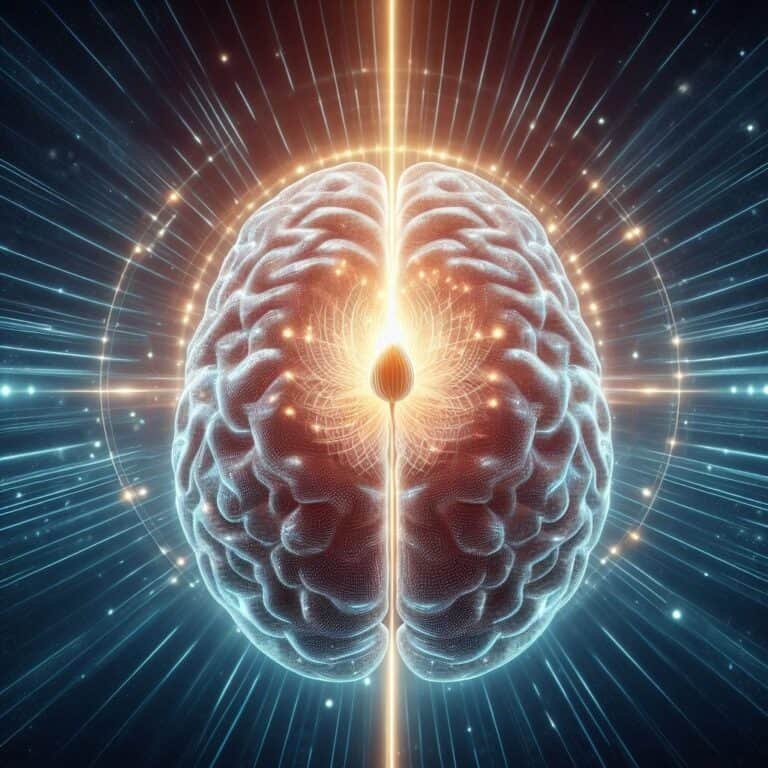Pineal Gland Calcification Symptoms & Detection Signs Guide

Wellness Fixation is reader supported, meaning I may earn a small commission if you purchase something through my links at no extra cost to you. Thanks for your support! Learn more
Key Takeaways
- Pineal gland calcification can disrupt sleep patterns due to reduced melatonin production.
- Symptoms may include sleep disturbances, cognitive issues, and emotional changes.
- Early detection through imaging tests like X-rays and MRIs is crucial for effective management.
- Natural remedies such as dietary adjustments and lifestyle changes can support pineal gland health.
- Consulting with healthcare professionals is important for persistent symptoms and potential medical interventions.
Overview of Pineal Gland Calcification Symptoms
The pineal gland, a small endocrine gland located in the brain, plays a crucial role in regulating sleep-wake cycles through the production of melatonin. However, as we age, this gland can become calcified, which means calcium deposits form on it. This calcification is quite common and can sometimes interfere with the gland’s ability to function properly.
What is Pineal Gland Calcification?
Pineal gland calcification refers to the accumulation of calcium deposits in the pineal gland. While some degree of calcification is normal, excessive calcification can hinder the gland’s ability to produce melatonin, a hormone that regulates sleep. This can lead to various health issues, particularly those related to sleep and mood.
Why the Pineal Gland is Important
The pineal gland is often referred to as the “third eye” due to its position deep within the brain and its connection to light perception. It is responsible for producing melatonin, which helps regulate our circadian rhythms, essentially telling our body when it’s time to sleep and wake up. Therefore, a healthy pineal gland is essential for maintaining good sleep hygiene and overall well-being.
General Causes of Calcification
There are several theories as to why calcification occurs in the pineal gland. One common belief is that it is a natural part of aging. However, studies have shown that calcification can occur even in young individuals, suggesting other contributing factors. Some potential causes include:
- Fluoride exposure: Found in water and dental products, fluoride may contribute to calcification.
- Dietary factors: High calcium intake or imbalances in other minerals might play a role.
- Environmental toxins: Exposure to certain chemicals and pollutants can affect gland health.
Recognizing Pineal Gland Calcification Symptoms
Recognizing the symptoms of pineal gland calcification is crucial for addressing potential health issues early on. While some people may not experience noticeable symptoms, others might face significant disruptions in their daily lives.
Symptoms can vary widely from person to person, but they often relate to sleep, cognition, and emotional well-being. It’s important to pay attention to any changes in these areas, as they could be indicative of calcification affecting the pineal gland.
Common Symptoms People May Experience
Symptoms of pineal gland calcification can manifest in various ways, impacting both physical and mental health. Some common symptoms include:
- Insomnia or difficulty falling asleep
- Frequent waking during the night
- Fatigue or excessive daytime sleepiness
- Difficulty concentrating or memory issues
- Mood swings or increased anxiety
Potential Impact on Sleep Patterns
One of the most significant effects of pineal gland calcification is its impact on sleep patterns. Since the gland is responsible for melatonin production, calcification can lead to reduced melatonin levels. This reduction can result in insomnia or other sleep disorders, making it difficult for individuals to maintain a regular sleep schedule.
Other Cognitive and Emotional Effects
Besides sleep disturbances, calcification of the pineal gland can also affect cognitive functions and emotional health. Individuals may experience difficulties with concentration, memory, and decision-making. Additionally, emotional changes such as increased anxiety, irritability, or depression can occur, affecting one’s quality of life.
Role of Imaging Tests and Technology
Detecting pineal gland calcification often requires the use of advanced imaging tests. These tests allow healthcare professionals to visualize the extent of calcification and assess any potential impact on the gland’s function. X-rays and MRIs are commonly used for this purpose. They provide detailed images of the brain, helping doctors identify calcium deposits in the pineal gland.
While X-rays can highlight calcification, MRIs offer a more comprehensive view of the brain’s structure. MRIs can detect even small calcifications and provide valuable information about the surrounding tissues. This level of detail is crucial for accurately diagnosing the condition and planning any necessary interventions. For those interested in alternative approaches, exploring natural ways to detoxify the pineal gland may also be beneficial.
In some cases, a CT scan may also be used. CT scans combine X-ray images taken from different angles to create a cross-sectional view of the brain. This can be particularly useful for understanding the full extent of calcification and its potential effects. For more information on maintaining brain health, you can refer to optimizing your pineal gland health.
- X-rays: Useful for detecting calcification, but less detailed than MRIs.
- MRIs: Provide a detailed view of the brain’s structure, including small calcifications.
- CT Scans: Offer a comprehensive view by combining multiple X-ray images.
Importance of Early Detection
Early detection of pineal gland calcification is vital for managing symptoms and preventing further complications. By identifying calcification early, individuals can take proactive steps to support their gland’s health and mitigate any negative effects. Early intervention can also help prevent the progression of symptoms, such as sleep disturbances and cognitive issues.
Natural Approaches for Pineal Gland Health
There are several natural approaches you can take to support the health of your pineal gland and potentially reduce calcification. These methods focus on dietary changes, lifestyle habits, and natural supplements, all of which can promote overall wellness and improve gland function. For more detailed information, check out this complete guide on optimizing your pineal gland health.
Dietary Changes to Consider
Diet plays a crucial role in maintaining a healthy pineal gland. Certain foods and nutrients can support the gland’s function and potentially reduce calcification. Here are some dietary changes to consider:
- Increase magnesium intake: Foods like spinach, almonds, and avocados are rich in magnesium, which may help prevent calcification.
- Consume iodine-rich foods: Iodine is essential for gland health, so consider adding seaweed, fish, and dairy products to your diet.
- Limit fluoride exposure: Since fluoride can contribute to calcification, try to minimize consumption by using fluoride-free toothpaste and drinking filtered water.
Lifestyle Habits That Support Pineal Health
Besides dietary changes, certain lifestyle habits can also promote a healthy pineal gland. These habits focus on reducing stress and exposure to environmental toxins, which can negatively impact gland function.
First and foremost, prioritize sleep hygiene. Establish a regular sleep schedule by going to bed and waking up at the same time each day. This consistency helps regulate your body’s internal clock and supports melatonin production.
Additionally, reduce stress through mindfulness practices like meditation or yoga. Chronic stress can disrupt hormone production, so managing stress is crucial for maintaining gland health.
Natural Supplements and Remedies
Several natural supplements can support pineal gland health and potentially reduce calcification. While supplements should not replace a balanced diet, they can complement your efforts to promote wellness.
Melatonin supplements, for example, can help regulate sleep patterns and support the gland’s function. However, it’s important to consult with a healthcare professional before starting any new supplement regimen. For more information, check out this guide on optimizing your pineal gland health.
Herbal remedies like chamomile and valerian root may also promote relaxation and improve sleep quality. These herbs have calming properties that can help manage stress and support overall gland health.
Medical Interventions
While natural approaches can be beneficial, there are instances where medical interventions may be necessary. If symptoms persist or worsen, consulting with a healthcare professional is essential for proper diagnosis and treatment.
Doctors can recommend a range of interventions, from medications to lifestyle modifications, to address calcification and its associated symptoms. These interventions aim to improve the gland’s function and enhance overall well-being.
Options When Symptoms Persist
If natural remedies do not alleviate symptoms, medical treatments may be required. These treatments can include prescription medications to manage sleep disorders or mood changes. In some cases, hormone therapy may be recommended to support melatonin production and improve sleep quality.
Additionally, cognitive-behavioral therapy (CBT) can be effective in addressing anxiety or depression related to gland calcification. CBT helps individuals develop coping strategies and improve emotional well-being. For more information on maintaining your pineal gland’s health, check out this complete guide.
How to Discuss Concerns with a Doctor
When discussing concerns about pineal gland calcification symptoms with a doctor, it’s important to be open and honest about your symptoms. Prepare a list of symptoms you’ve experienced, including any changes in sleep patterns, mood, or cognitive function.
Ask questions about potential causes and treatment options, and express any concerns you may have about specific interventions. Remember, your doctor is there to help you navigate this condition and find the best solutions for your health.
Medications That Might Be Recommended
Depending on the severity of symptoms, doctors may prescribe medications to manage specific issues related to pineal gland calcification. These medications can include:
- Melatonin supplements: To regulate sleep patterns and improve sleep quality.
- Antidepressants or anti-anxiety medications: To address mood changes or anxiety.
- Hormone therapy: To support melatonin production if levels are significantly low.
It’s crucial to follow your doctor’s recommendations and discuss any side effects or concerns you may have about prescribed medications. Your healthcare provider will work with you to find the most effective treatment plan for your needs. For more information on natural approaches, you can explore pineal gland detox methods.
Concluding Thoughts on Pineal Health
Maintaining the health of your pineal gland is an essential part of overall wellness. Understanding the signs of calcification and taking steps to support gland function can have a significant impact on your sleep, cognitive abilities, and emotional well-being. By being proactive and attentive to changes in your health, you can ensure that your pineal gland remains in optimal condition.
Summary of Key Points
Pineal gland calcification is a common occurrence, particularly as we age. While some calcification is normal, excessive amounts can lead to sleep disturbances, cognitive issues, and emotional changes. Early detection through imaging tests is crucial, as it allows for timely intervention and management of symptoms.
Natural approaches, such as dietary changes and lifestyle modifications, can support the health of your pineal gland. However, if symptoms persist, consulting with a healthcare professional is important for proper diagnosis and treatment. Medical interventions, including medications and therapy, may be necessary in some cases.
Encouragement for Proactive Health Management
Taking charge of your health and well-being is empowering. By staying informed about the potential effects of pineal gland calcification and adopting natural remedies, you can make a positive impact on your life. Remember, small changes in diet, lifestyle, and stress management can lead to significant improvements in gland function and overall wellness.
Don’t hesitate to seek medical advice if you’re concerned about symptoms or need additional support. Your healthcare provider can offer guidance and recommendations tailored to your individual needs. Together, you can work towards maintaining a healthy pineal gland and a balanced life.
Frequently Asked Questions
Understanding pineal gland calcification and its implications can help you make informed decisions about your health. Here are some common questions and answers to provide further clarity on this topic.
What causes pineal gland calcification?
Calcification of the pineal gland can occur due to a variety of factors, including aging, fluoride exposure, dietary imbalances, and environmental toxins. While it is a natural part of aging, excessive calcification can be influenced by these external factors.
How can pineal gland calcification impact sleep?
Since the pineal gland is responsible for producing melatonin, calcification can lead to reduced melatonin levels. This reduction can disrupt sleep patterns, resulting in insomnia or other sleep disorders. Therefore, maintaining a healthy pineal gland is crucial for good sleep hygiene.

For instance, if you notice difficulty falling asleep or frequent nighttime awakenings, these could be signs of calcification affecting your sleep cycle. Addressing these issues early can help prevent long-term sleep disturbances.
Moreover, chronic sleep deprivation due to calcification can lead to fatigue, irritability, and decreased cognitive function. Taking steps to support gland health can improve sleep quality and overall well-being.
Is it possible to reverse calcification naturally?
While it may not be possible to completely reverse calcification, certain natural remedies can help support pineal gland health and potentially reduce its progression. Dietary changes, such as increasing magnesium and iodine intake, can promote gland function.
Additionally, reducing fluoride exposure and managing stress through mindfulness practices can also be beneficial. These approaches aim to create an environment that supports optimal gland health and function.
What are the risks of untreated calcification?
Untreated calcification can lead to a range of symptoms, including sleep disturbances, cognitive decline, and emotional changes. Over time, these issues can impact daily life, affecting productivity, mood, and overall quality of life.
What foods support pineal gland calcification?
Foods that support pineal gland health include those rich in magnesium, such as spinach, almonds, and avocados. Iodine-rich foods like seaweed, fish, and dairy products are also beneficial. These nutrients can help maintain gland function and potentially reduce calcification. For more information, you can read about pineal gland health on Cleveland Clinic’s website.

Conversely, it’s important to limit foods and substances that may contribute to calcification, such as fluoride. Opt for fluoride-free products and filtered water to minimize exposure. For more information on detoxifying your pineal gland, explore natural ways to decalcify.
Example: “In a study examining the effects of dietary changes on pineal gland health, participants who increased their intake of magnesium-rich foods reported improved sleep quality and reduced symptoms of calcification.”
By making informed dietary choices, you can support the health of your pineal gland and promote overall wellness. For more information, consider exploring optimizing your pineal gland health.
What are pineal gland calcification symptoms?
Symptoms of pineal gland calcification can vary, but they often include sleep disturbances, such as insomnia or difficulty staying asleep. Cognitive issues, like memory problems and difficulty concentrating, are also common.
Emotional changes, such as increased anxiety or mood swings, may occur as well. It’s important to pay attention to these symptoms and seek medical advice if they persist or worsen.
Early detection and intervention can help manage symptoms effectively and improve quality of life. By understanding the signs of calcification, you can take proactive steps to support your pineal gland’s health, such as exploring natural ways to detoxify your pineal gland.
In conclusion, maintaining a healthy pineal gland is essential for overall wellness. By recognizing symptoms, adopting natural remedies, and seeking medical advice when necessary, you can ensure that your gland functions optimally and supports your health journey.
Pineal gland calcification can lead to various symptoms such as sleep disturbances, depression, and anxiety. Detecting these symptoms early can be crucial for maintaining overall health. Many people explore natural methods to address this issue. For instance, some turn to pineal gland detox techniques as a way to decalcify and detoxify the gland. Understanding the signs and taking proactive steps can help in managing the effects of calcification.






